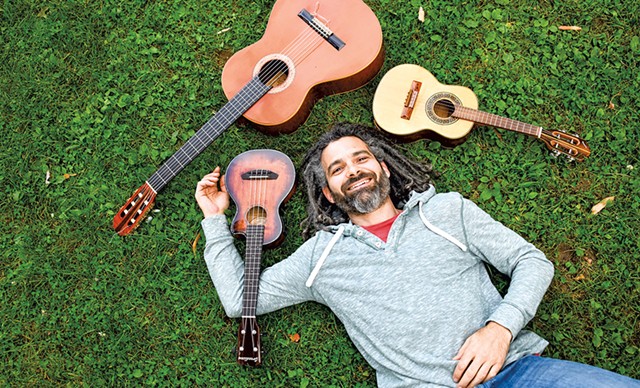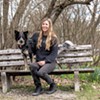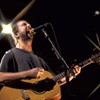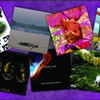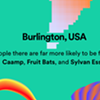Switch to the mobile version of this page.
Vermont's Independent Voice
- News
- Arts+Culture
- Home+Design
- Food
- Cannabis
- Music
- On Screen
- Events
- Jobs
- Obituaries
- Classifieds
- Personals
Browse News
Departments
Browse Arts + Culture
View All
local resources
Browse Food + Drink
View All
Browse Cannabis
View All
-
Culture

'Cannasations' Podcaster Kris Brown Aims to 'Humanize'…
-
True 802

A Burlington Cannabis Shop Plans to Host…
-
Business

Judge Tosses Burlington Cannabiz Owner's Lawsuit
-
Health + Fitness

Vermont's Cannabis Nurse Hotline Answers Health Questions…
-
Business

Waterbury Couple Buy Rare Vermont Cannabis License
Browse Music
View All
Browse On Screen
Browse Events
Browse Classifieds
Browse Personals
-

If you're looking for "I Spys," dating or LTRs, this is your scene.
View Profiles
Special Reports
Pubs+More
Raphael Groten Makes Music for Kids as G'Raph
Published September 8, 2021 at 10:00 a.m.
Raphael Groten searched the room for a drum that could reverberate one's molecules. He returned to his chair with a satisfied grin, and the drum.
"What is sound doing?" Groten asked me. "What is music doing?"
He tapped the drum with his fingers, producing a short thooom.
"The answer is, vibrating," he said, his smile widening beneath his beard. "We're all vibrating, all the time."
Groten plays his vibrating drums — as well as guitars, banjos, ukuleles, cavaquinho, gongs and even literally his kitchen sink — on two new records.
The first is his latest solo effort, Potential, released on September 1. Groten calls the music "world medicine groove," and the album focuses on acoustic "healing" sounds, he said. So did his two previous records: 2015's Journey Home and 2019's Star Lullaby — both recorded at legendary contemporary classical guitarist Will Ackerman's Imaginary Road Studios in Dummerston.
The second new album, due out on October 1, focuses on vibes of a different sort. Drawing on decades of playing songs in classrooms, Groten delved into his sillier side to create his first collection of original material written for children and families: Happily Ever Now. Released under the moniker G'Raph, it represents a new phase in Groten's career.
Groten, 47, grew up in Poughkeepsie, N.Y. His mother played music in preschools. When he was 8, a teacher put a saxophone in his hand, the first of many instruments Groten would learn to play through his adolescence.
He moved to Burlington in 1992 to attend the University of Vermont, where he majored in philosophy and minored in music. Upon graduating in 1996, he formed his first band, playing guitar in the Latin-jazz-funk ensemble Saudade.
Groten's two sons were born in 1999 and 2001, and he soon found himself drawn to playing music for children.
"I grew up in this folk tradition," he explained of his upbringing, which he said included many Pete Seeger records. "Music is part of everyday life in that kind of household."
Playing for his own kids soon morphed into playing for children in schools, preschools and libraries around Vermont.
"I was so taken by it, playing libraries and teaching with the guitar, the ukulele and the kazoo ... teaching the kids to laugh and clap and sing," he said.
He credits those same kids with inspiring his new moniker.
"The kids I've taught over the years have always had different names they called me," Groten revealed. "G'Raph just stuck."
During the day, he worked with children; at night, he wrote music aimed at a decidedly grown-up audience, including for Guagua, the local "psychotropical jazz" band he formed in 2002. But when the pandemic hit, Groten could no longer interact in the same way with the kids he loved playing for.
"Once the lockdown was on, I was just stuck at home like everyone," he said. "I recorded every traditional kids' song I could think of and put them up on YouTube for parents to use. I used Zoom to sing for the kids sometimes, too, but otherwise, that was it."
Then one day, as he walked past his guitar on the couch, he felt the urge to compose something different.
"Rarely do I sit down to intentionally write something," Groten admitted. "But sometimes, an instrument calls out to you and tells you that, if you pick it up, something will come through."
The song he wrote that day was "Monster Truck." As he recalled the origins of the song, he dropped his voice into a cartoonishly low register — his best version of a friendly monster — and sang-growled the words "monster truck."
"The song just wanted to be written. It had to come out," he said.
He wrote the rest of the songs quickly after that. Musically, the project engaged Groten in surprising ways. He found himself delving into funk and electronica, as well as African and Cuban rhythms, to write songs such as "I Can Eat a Rainbow" and "Don't Pick Your Nose."
The subject matter, however, usually picked itself. Groten drew inspiration from his pre-pandemic visits to classrooms.
He recalled laughing with teachers as "so many of these kids were just sticking their fingers straight up their nose."
"So even though it feels a little silly ... it's actually natural to write a song telling them not to pick their nose," he continued. "It's simple, but that's what works."
"Don't put your fingers in your mouth," he admonishes in "Don't Pick Your Nose." "But if you do, then take 'em out / And then go and wash your hands and come back and join the band / We can rock and we can roll and keep our germs under control."
When asked about the difference between playing for a classroom full of preschoolers and a late-night set at the bar, Groten laughed.
"It's pretty much the same," he revealed. "There's not much body awareness going on in the crowd. Some of them are throwing up in the corner. They're not really paying attention to the music or are walking right up and putting their hands on your guitar..."
Then Groten shrugged. "Seriously, though, when you have the attention of an adult audience, it's really rich, and everyone is hyperaware. It's a very cool feeling," he said. "When you have an audience full of children, though, you have this raw energy and power."
He estimates that in his first year performing for preschoolers, he played "Wheels on the Bus" and "Old MacDonald Had a Farm" more than 800 times. But he swears that he never got sick of the tunes.
"It's hard to describe how amazing it feels to play music with the kids," Groten said.
The educational aspects of playing kids' music complement Groten's other musical passion: healing through sound.
After his youngest son was injured in a car accident in 2002, Groten pursued music as a healing agent. He trained under shamanic instructors, including Zacciah Blackburn at the Center of Light Institute of Sound Healing and Shamanic Studies in Chester. He took holistic health classes and played solo guitar in the atrium at Fletcher Allen Health Care — now the UVM Medical Center — on a volunteer basis.
Since then, Groten has focused on music's healing properties, including in his latest adult LP, Potential.
"Sound affects the very structure of our cells," Groten asserted. "As we make or hear a certain tone, on some level we're experiencing vibrations that create all sorts of reactions in our bodies. And that's just if you're trying to understand it scientifically. What I know intrinsically is that sound soothes."
How music affects our mental and physical health is a subject Groten hopes more children, teens and adults explore.
"Some people reach adulthood and start to feel empty inside no matter what, and they might not understand why that is," Groten posited. He suggests "drawing a picture, or picking up a guitar. It doesn't have to be good or sound professional; it just needs to feel good to you!"
He hopes Happily Ever Now might encourage his young listeners to avoid that sort of ennui. If nothing else, putting out kids' music seems to have lit a fire in Groten. In addition to his two new albums, he has another G'Raph record on the back burner ready to go.
"There's a part of me that's an entertainer, and there's a part of me who is a hermit," Groten declared. "My adult guitar music can be serious and contemplative. But the kids' music is an outlet to express my more jovial nature."
Groten paused to look out his window before continuing.
"And yeah, I'm a country mouse for the most part. But it doesn't matter where you are, as long as you listen to the muse when the muse shows up," he said.
The original print version of this article was headlined "Child's Play"
Got something to say?
Send a letter to the editor
and we'll publish your feedback in print!
More By This Author
About The Author

Chris Farnsworth
Bio:
Music editor Chris Farnsworth has written countless albums reviews and features on Vermont's best musicians, and has seen more shows than is medically advisable. He's played in multiple bands over decades in the local scene and is a recording artist in his own right. He can often be found searching for the perfect soft pretzel or listening to a podcast about the X-Men.
Music editor Chris Farnsworth has written countless albums reviews and features on Vermont's best musicians, and has seen more shows than is medically advisable. He's played in multiple bands over decades in the local scene and is a recording artist in his own right. He can often be found searching for the perfect soft pretzel or listening to a podcast about the X-Men.
Comments
Comments are closed.
From 2014-2020, Seven Days allowed readers to comment on all stories posted on our website. While we've appreciated the suggestions and insights, right now Seven Days is prioritizing our core mission — producing high-quality, responsible local journalism — over moderating online debates between readers.
To criticize, correct or praise our reporting, please send us a letter to the editor or send us a tip. We’ll check it out and report the results.
Online comments may return when we have better tech tools for managing them. Thanks for reading.
- 1. Soundbites: Burlington Record Plant On the Move Music News + Views
- 2. Three Quick-Hit Reviews of Local Albums Album Review
- 3. On the Beat: New Music From Phish and a Family Folk Affair in Grafton Music News + Views
- 4. Soundbites: Umphrey's McGee Loves Burlington Music News + Views
- 5. Six Quick-Hit Reviews of Local Albums Album Review
- 6. Frankie White, 'brain dead' Album Review
- 7. On the Beat: maari Drops 'Eyes Wide Shut,' and a Farewell Show for Pete Sutherland Music News + Views
- 1. Soundbites: Trouble & Together at the Flynn Music News + Views
- 2. Soundbites: Burlington Record Plant On the Move Music News + Views





























